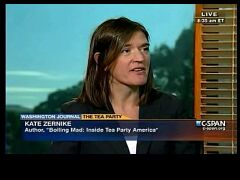Hostile Reporter Kate Zernike Insists 'Tea Party Fervor' Creating Opportunities...for Democrats
The Times is traditionally hypersensitive to Republican weaknesses during the congressional election cycles. Former chief political reporter Adam Nagourney was the master of the form. He's on the California beat now, but reporter Kate Zernike is already in electoral season shape.
Zernike, whose reporting on the Tea Party movement constantly suggests racism as a driving factor, has a front-page story in Monday's Times arguing the group's extremism and slate of inexperienced candidates might backfire on the Republican Party in November. "For G.O.P., Tea Party Wields a Double-Edged Sword," indulged in the idea that the enthusiasm of the Tea Party on the conservative side would end up benefiting the Democrats in the November elections. Zernike begins by picking through the garbage of Christine O'Donnell, a popular Tea Party candidate in Delaware:
Christine O'Donnell, running in Delaware to be the Republican nominee for the Senate seat once held by Vice President Joseph R. Biden Jr., is a perennial candidate with a history of financial problems, including unpaid taxes and a home in foreclosure. Representative Michael N. Castle, her opponent in the primary, is a veteran congressman and former governor who has won statewide elections more than 10 times.
But Ms. O'Donnell has the backing of the Tea Party, and suddenly Delaware has become the latest Republican civil war battlefield. National Tea Party groups are pouring money into Ms. O'Donnell's campaign, while establishment Republicans are attacking her with more ferocity than they have shown toward the Democrat in the race, worried that Ms. O'Donnell is the bigger threat to the party's winning the seat in November.
The battle in Delaware is just the latest reminder that as much as the Tea Party fervor is expected to help Republicans in November, it may also create problems for them - and opportunities for the Democrats.
....
In some House races, Republicans have all but given up hope of winning after local Tea Party groups helped conservative candidates win primaries in districts that historically prefer moderates. And in some districts, Tea Party candidates are mounting third-party challenges that could allow the Democrats to maintain or even win some seats.
....
In many places, the impact will be from Tea Party groups - local, national or both - that are working to mobilize voters. In others, however, the Tea Party is complicating what should have been easy Republican primary victories.
In the Eighth Congressional District in Arizona, for instance, a seat held comfortably by Republicans until 2006, Democrats had worried that their incumbent, Representative Gabrielle Giffords, would lose. They rejoiced when the Tea Party candidate, Jesse Kelly, beat Jonathan Paton, who had been backed by Republicans in Washington.
....
With the economy still working against Democrats, they say they are hoping to benefit from concerns about Tea Party extremism.
Zernike helpfully forwarded Democratic arguments on Tea Party "extremism."
The Democrats are playing up the candidates' support for things that are standard Tea Party positions, but unpopular among most Americans: getting rid of the Departments of Energy, Commerce and Education; phasing out Social Security and Medicare; and instituting a 23 percent national sales tax to replace the income tax.
The arguments seem to be gaining the most traction in Kentucky and Nevada, where the nominations of Tea Party candidates have helped keep Democrats in the running - particularly Senator Harry Reid of Nevada, the Democratic leader, who is considered among the most vulnerable incumbents. In Kentucky, the Democrat, Jack Conway, gained the support of the state's police union last month after raising concerns about Mr. Paul's opposition to federal antidrug efforts, a position unpopular among rural voters whose communities have been ravaged by methamphetamine.
Zernike dug deep for Republican pressure points, pinpointing several races across the nation where the Tea Party could possibly cost the Republicans a victory.



